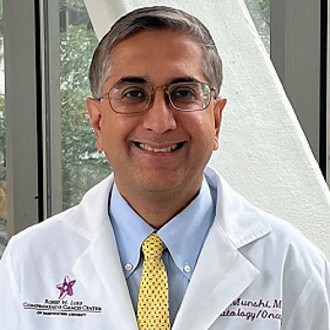The Eklund Lab, let by Elizabeth Eklund, MD, is working to understand the molecular events that lead to development of myeloid leukemias (acute myeloid leukemia and chronic myeloid leukemia) and to the evolution of drug resistance in these diseases. The goal is to identify potential molecular therapeutic targets that would delay or prevent drug resistance and relapse in AML and CML. In related projects, the laboratory is investigating Fanconi Anemia, a genetic disease with defective DNA repair. Patients with Fanconi Anemia frequently develop leukemia and provide a model for understanding the role of DNA repair in leukemogenesis.
Publications
View lab publications via PubMed.
For more information, visit Eklund's faculty profile.
Contact Us
Contact Eklund at 312-503-3208 or the lab at 312-503-3208.
The Lin Lab focuses on lymphoma, cellular therapies, and stem cell transplantation. Our lab, the Nanotechnology and Biomaterials Lab for Blood Cancers, aims to bridge the gap between technological advancements and their use in clinical or personalized medicine to provide new treatment options for patients with hematologic malignancies; "Find the right technology for the right patient."
For more information, visit Lin's faculty profile.
Contact Us
Adam Y Lin, MD,PhD
676 North Saint Clair St., Arkes 850, Chicago, IL 60611
adam.lin@northwestern.eduThe Liu lab is interested in investigating the molecular mechanisms governing normal and malignant hematopoiesis, with an emphasis on understanding hematopoietic stem cell (HSC) self-renewal and pathogenesis of myeloid malignancies, including myelodysplastic syndromes (MDS) and acute myeloid leukemia (AML).
For more information, visit Yan Liu's faculty profile.
The Munshi Lab is focused on understanding the role of the key collagenase MT1-MMP (MMP-14) and members of the Snail family transcription factors in pancreatic cancer progression using transgenic mouse models. We are also interested in understanding how the pronounced fibrotic reaction induces epigenetic changes to contribute to chemotherapy resistance. We have shown that the collagen microenvironment induces histone acetylation and that targeting 'readers' of histone acetylation marks using BET inhibitors can limit growth of pancreatic cancer cells. We plan to evaluate the efficacy of BET inhibitors in our mouse models with the eventual goal of testing this class of inhibitors in patients with pancreatic cancer.
Publications
View lab publications via PubMed.
For more information, visit the faculty profile page of Hidayatullah G Munshi, MD.
Contact Us
Contact Hidayatullah Munshi, MD, at 312-695-6180 or the Munshi Lab at 312-503-0312.
Cell signaling is part of an intricate system of events activated by various stimuli that coordinate cell responses. Our laboratory is interested in unveiling pathways involved in cancer development in order to target them and control cancer progression. For over two decades, the Platanias Laboratory has identified several cellular cascades activated by IFN, ATRA and arsenic.
Our research on Type I IFN found an essential role for SKAR protein in the regulation of mRNA translation of IFN-sensitive genes and induction of IFN-α biological responses. We also provided evidence for unique function of mTORC2 complex in inducing Type I IFN response. Our studies on arsenic signaling revealed a direct binding of this compound to a kinase called AMPK as a mechanism underlying its anti-leukemic activity. Other work included the activation of biological responses by BCR-ABL oncoprotein through the mTOR pathway.
The Platanias Laboratory — led by Leonidas Platanias, MD, PhD — is also involved in testing new compounds in combination with approved therapies in order to identify synergy and improve the risk/benefit ratios of current therapeutic regimens for patients.
For more information, visit Platanias' faculty profile.
Publications
View lab publications via PubMed.
Contact
Contact Platanias at 312-908-5250 or the lab at 312-503-4500.
The Peter Lab studies various forms of cell death including apoptosis, which is a fundamental process to regulate homeostasis of all tissues and to eliminate unwanted cells specifically in the immune system. Another interest lies in the study of RNA interference and based on toxic RNAs to development a novel form of cancer treatment.
The Pollack Lab is a cancer immunology lab dedicated to curing sarcomas, cancers of the bone and soft tissue. Our ground-breaking work has led to important discoveries resulting in multiple clinical trials that are actively shaping the care of sarcoma patients all around the world. Furthermore, through the careful study of these unique cancers, we have uncovered fundamental insights that are shaping the development of immunotherapy for all cancers.
For more information, visit Seth Pollack's faculty profile.
The Zhang Lab is focused on understanding the mechanisms of tumor-induced immune evasion. The overall goal is to develop novel and feasible strategies to improve cancer immunotherapy. Principal investigator Bin Zhang, MD, PhD, has been recently interested in the tumor microenvironment complexity whereby CD73 functions as an ecto-enzyme to produce extracellular adenosine, which limits anti-tumor T cell immunity. He is exploring the detailed mechanisms of CD73 by which the tumors evade the immune system using a combination of molecular, biochemical and mouse genetic approaches and to accomplish the targeted elimination of CD73 as a novel means to enhance cancer immunotherapy.
Other ongoing studies are working to:
- Analyze the contribution of new key molecules including microRNAs from the perspective of cancer immunology in regulating regulatory T cells and/or myeloid derived suppressive cells
- Define a novel use of pre-existing chemotherapy drugs to overcome tumor-mediated immunosuppression
- Characterize the role of novel molecules in tumor T cell immunity and autoimmunity
- Understand the differential immune regulation in GVHD vs. GVL
- Develop new animal models that can be employed in preclinical studies to most reflect human clinical trials.
Publications
View lab publications via PubMed.
For more information, visit Zhang's faculty profile.
Contact Us
Contact Zhang at 312-695-6180 or the lab at 312-503-2435.
